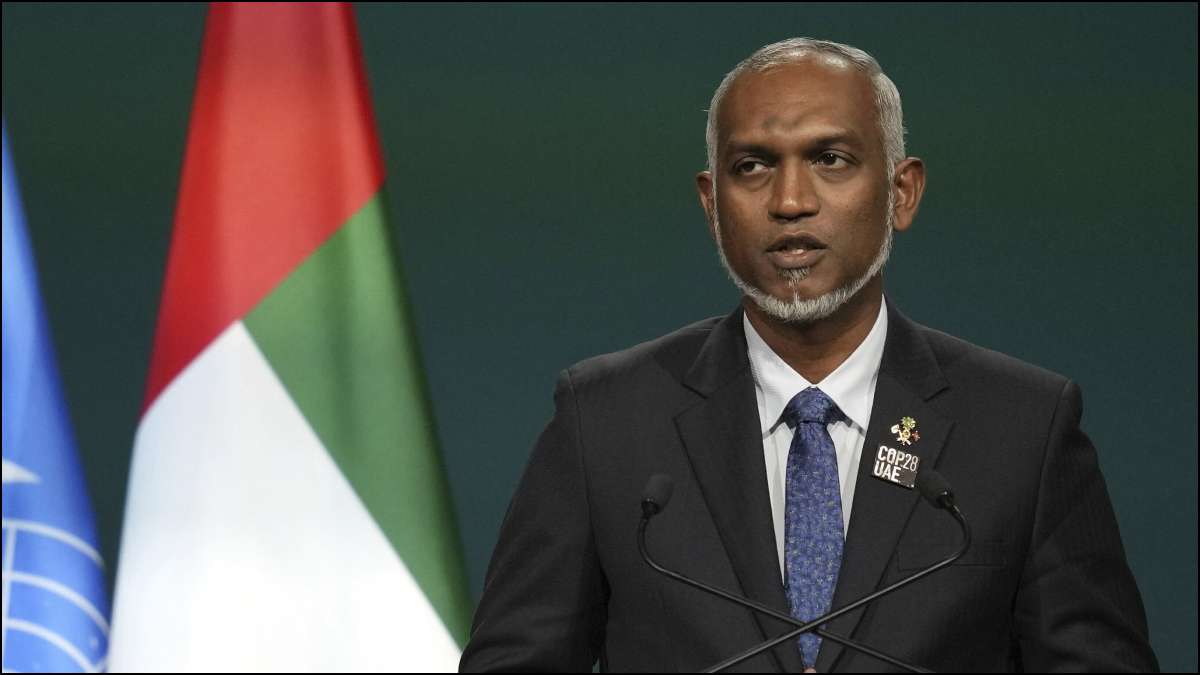
Maldives President Mohamed Muizzu departed for China with his wife Sajidha Mohamed for an official state visit on Sunday night, following an invitation by Chinese President Xi Jinping. Muizzu, who is largely considered a pro-Beijing leader, is visiting China amid strained relations with India over the withdrawal of Indian military personnel from the country.
During the visit, both countries are expected to sign several agreements to further bolster their bilateral relations, and Xi will host a welcome ceremony and a welcome banquet for Muizzu. The two presidents will hold talks and will attend the signing ceremony of bilateral cooperation documents.
“In the past 52 years since the establishment of diplomatic ties, the two countries have treated each other with respect and supported each other, setting a fine example of equality and mutual benefits between countries of different sizes,” said Wang Wenbin, the Chinese foreign ministry spokesperson.
Chinese Premier Li Qiang and Chairman of the Standing Committee of the National People’s Congress Zhao Leji will meet with Muizzu respectively. Muizzu will be the second-highest politician to visit China in recent weeks after the newly-elected Vice President Mohamed Latheef.
Muizzu’s impact on relations with India
Muizzu’s predecessors in the recent past visited India first, considering the wide-ranging bilateral ties and the Maldives’ proximity to India, followed by China which has expanded its influence in the island nation by investing in major infrastructure projects there.
However, Muizzu ditched India for his first official visit and instead visited Turkey in November. This was seen as another sign of the Maldives President’s anti-India stance, as he is trying to steer the island country away from Indian assistance. Even Abdullah Yameen, Muizzu’s close associate and the openly pro-China ex-leader of the Progressive Party of Maldives, came to India on his first foreign visit.
However, Muizzu later met Prime Minister Narendra Modi during the UN Climate Change Conference, known as COP28, in Dubai on December 1 and discussed the progress of the wide-ranging bilateral ties. Both leaders agreed to set up a core group to discuss the multi-dimensional relations and further deepen ties.
Relations between Maldives and India have been strained since Muizzu was elected to power in November last year. The pro-China leader, who rose to prominence in the ‘India Out’ campaign, had accused his predecessor Ibrahim Mohamed Solih, who had warm relations with New Delhi, of allowing Indian troops in the island nation.
After becoming the President, Muizzu demanded the removal of 77 Indian personnel and also ordered a review of 100 agreements with India. Muizzu’s government also announced its plans to drop a hydrographic survey agreement with India.
The Maldives remains one of the biggest beneficiaries of India’s Neighbourhood First policy, which contributed significantly to public welfare, humanitarian assistance, disaster relief and combating illegal maritime activities in the country.
Soon after his election Muizzu fell out with former pro-China President Abdulla Yameen, regarded as his mentor, and opted to pursue his own foreign and domestic policy. Under Yameen’s Presidency, China carried out major infra projects amid allegations of debt traps by some influential politicians of the Maldives. Yameen quit the ruling Progressive Party and formed his own People’s National Front (PNC) from jail.
Derogatory remarks towards PM Modi
A fresh controversy erupted that threatens to further damage India-Maldives relations, when some ministers in Male made derogatory remarks towards the Indian Prime Minister over his recent visit to Lakshadweep. Mariyam Shiuna, Deputy Minister of Youth Empowerment, Information and Arts, while commenting on the photos of PM Modi, dubbed him as a ‘clown’ and a ‘puppet of Israel’. Some ministers even commented that Indian beaches could not meet the cleanliness levels of Maldives tourist places.
“The move is great. However, the idea of competing with us is delusional. How can they provide the service we offer? How can they be so clean? The permanent smell in the rooms will be the biggest downfall,” Zahid Rameez, a Council member of the ruling Progressive Party of Maldives (PPM) wrote on X.
This triggered a major row on social media platforms, as thousands of Indians cancelled their bookings and flight tickets to Maldives. High-profile celebrities like Akshay Kumar also took to social media to condemn the remarks made against the head of state. The remarks have heightened concerns among Maldivians themselves, as their economy is heavily dependent on tourism, to which India contributes the highest.
The Muizzu administration suspended three ministers and said that the comments did not reflect the views of the government. Three Maldives ministers – Mariyam Shiuna, Malsha and Hassan Zihan – were suspended after the Indian High Commission raised the matter.
Several high-profile politicians and experts in the Maldives, including ex-President Mohamed Nasheed, Solih, former foreign minister Abdulla Shahid and others also condemned the ‘appalling language’ used towards PM Modi, saying that India has been a vital ally for the island country. “India has always been a good friend to Maldives and we must not allow such callous remarks to negatively impact the age old friendship between our two countries,” said Solih.
Nasheed asked the Muizzu government to distance itself from the contentious and added it must give clear assurance to New Delhi that it did not reflect the foreign policy of Maldives. “India is a time tested friend and an unwavering ally. They have historically been the first to respond in our time of need. Our close relationship has been bound by mutual respect, history, culture and strong people-to-people relations,” said Shahid.
(with inputs from agencies)
Author: Gcd News
Global community development




